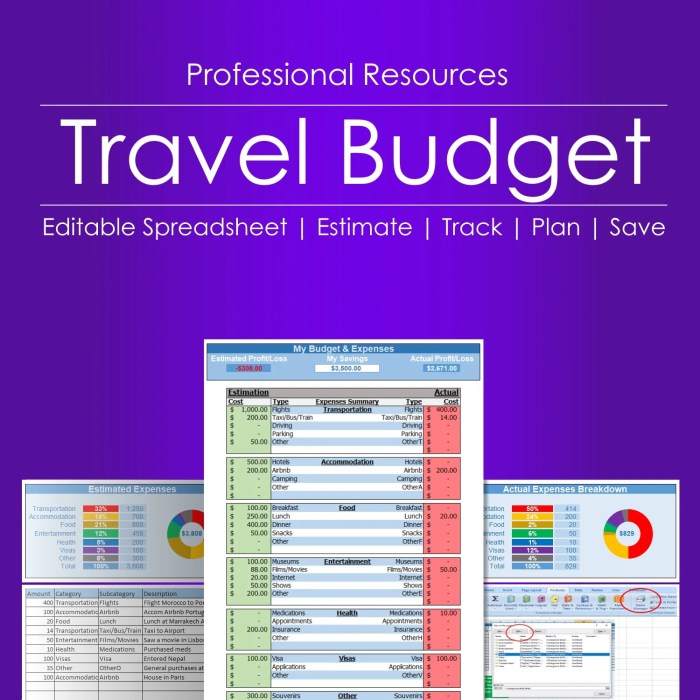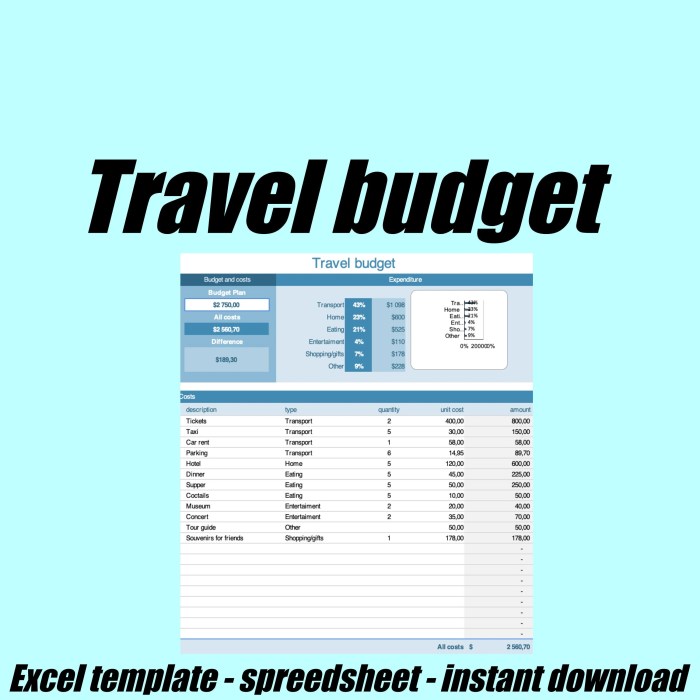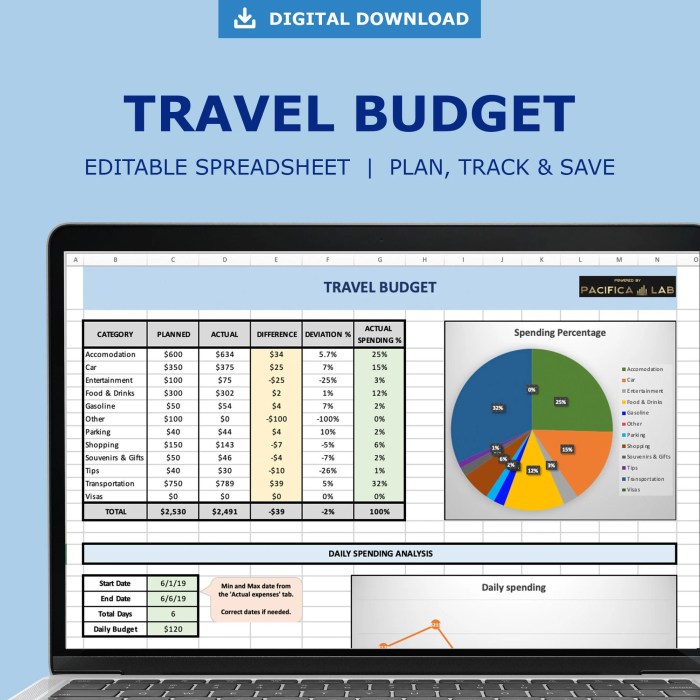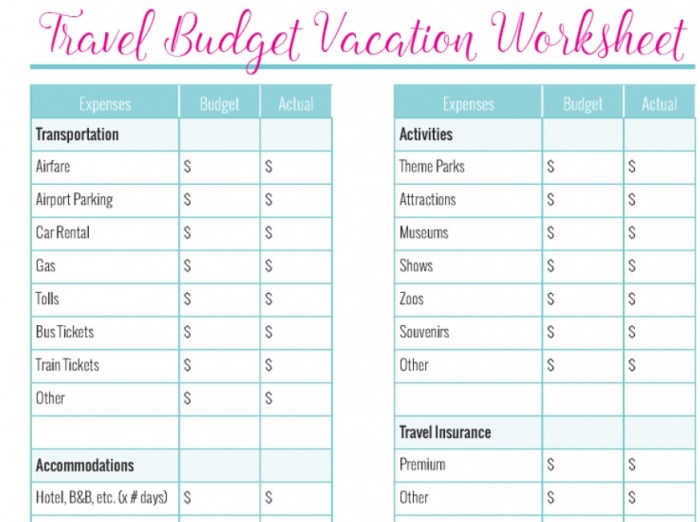Traveling doesn’t have to be a luxury reserved for the wealthy. With the help of a travel budget calculator, you can plan the vacation of your dreams without overspending or sacrificing comfort. Our comprehensive guide will provide you with all the tools and strategies you need to create a realistic budget, save money on travel expenses, and make the most of your hard-earned cash.
Understanding the components of a travel budget, the factors that influence travel costs, and the various budget planning methods will empower you to make informed decisions and optimize your travel experience. We’ll also explore cost-saving strategies, budget management tools, and real-world examples to help you navigate the world of travel budgeting with confidence.
Travel Budget Components
Understanding the essential components of a travel budget is crucial for effective planning and financial management. A comprehensive travel budget should consider both fixed and variable expenses, as well as direct and indirect costs.
Traveling with the family can be an expensive affair, but it doesn’t have to be. Using a travel budget calculator can help you estimate the costs of your trip and make sure you have enough money saved up. Once you have a budget in place, you can start planning your itinerary.
There are many great family vacation spots to choose from, such as best family vacation spots. When choosing a destination, be sure to consider the ages of your children and their interests. You’ll also want to factor in the cost of accommodations, food, and activities.
With a little planning, you can find the perfect family vacation spot that fits your budget and your needs.
Fixed Expenses
- Flights or transportation costs
- Accommodation (hotels, motels, hostels, etc.)
- Rental car or other transportation expenses
Variable Expenses
Variable expenses can vary depending on individual preferences and spending habits.
- Food and drinks
- Activities and excursions
- Souvenirs and shopping
li>Entertainment (movies, concerts, etc.)
Direct Costs
Direct costs are expenses directly related to the travel itself, such as:
- Transportation
- Accommodation
- Activities and excursions
Indirect Costs
Indirect costs are expenses incurred before or after the trip, such as:
- Passports and visas
- Travel insurance
- Pet care or house sitting
Considering all these components ensures a realistic and comprehensive travel budget that accounts for all potential expenses.
Factors Influencing Travel Costs

The cost of travel can vary significantly depending on several factors. Understanding these factors can help you plan a budget-friendly trip that meets your needs and preferences.
Destination
- The destination is one of the most significant factors that influence travel expenses. Major cities and popular tourist destinations tend to be more expensive than smaller towns or less-traveled areas.
- Consider factors such as the cost of accommodation, dining, transportation, and attractions when choosing your destination.
Travel Dates, Travel budget calculator
- The time of year you travel can also impact costs. Peak season, which varies depending on the destination, typically sees higher prices for flights, accommodation, and activities.
- Traveling during the off-season or shoulder season can often save you money.
Travel Style
- Your travel style plays a role in determining expenses. Luxury travelers can expect to pay more for high-end accommodations, gourmet dining, and exclusive experiences.
- Budget travelers, on the other hand, can save money by staying in hostels, eating at local eateries, and opting for free or low-cost activities.
Seasonality and Special Events
- Certain times of the year, such as holidays and festivals, can lead to increased travel costs due to higher demand.
- Special events, such as conferences or sporting events, can also drive up prices for flights, hotels, and other services.
Budget Planning Methods

Budget planning is crucial for any traveler, as it helps set realistic expectations, avoid overspending, and make the most of your travel experience. There are several methods to plan a travel budget, each with its own advantages and disadvantages. Let’s explore the most common methods and guide you in setting realistic budget goals.
One popular method is the percentage method, where you allocate a specific percentage of your income or savings to travel expenses. This method provides a structured approach and ensures that you have a dedicated fund for travel. However, it may not account for unexpected costs or varying travel expenses.
Another method is the destination-based budgeting, where you research the specific destination you plan to visit and estimate expenses based on factors like accommodation, food, activities, and transportation. This method provides a more tailored approach, but it can be time-consuming and requires thorough research.
The historical method involves reviewing your past travel expenses to estimate your future travel budget. This method provides a realistic estimate based on your actual spending habits. However, it may not account for changes in travel costs or new destinations.
Finally, the zero-based budgeting method requires you to allocate every dollar of your income to specific categories, including travel. This method provides a detailed and disciplined approach to budgeting, but it can be restrictive and may not allow for spontaneous expenses.
To set realistic budget goals, consider your financial situation, travel preferences, and destination. Research typical expenses for your destination and set aside a buffer for unexpected costs. Remember, the most effective budget planning method is the one that aligns with your financial goals and travel style.
Cost-Saving Strategies
Navigating travel expenses can be a daunting task, but with the right strategies, you can significantly reduce your costs without sacrificing the quality of your experience. This section will delve into practical tips and insights to help you optimize your travel budget and make the most of your hard-earned money.
From negotiating better deals to exploring off-season travel, we’ll uncover the secrets to unlocking cost savings and maximizing your travel value.
Negotiation Tactics
Negotiation is an essential skill when it comes to travel planning. By employing effective negotiation strategies, you can secure better deals on flights, accommodations, and activities. Here are some tips to help you negotiate like a pro:
- Research: Before reaching out to airlines, hotels, or tour operators, do your research to understand the average prices and any potential discounts or promotions available.
- Be flexible: Flexibility in your travel dates and destinations can give you more bargaining power. Consider traveling during off-season or shoulder season, or exploring alternative destinations that may offer lower costs.
- Be polite and persistent: Negotiation is not about being aggressive or demanding, but rather about finding a mutually beneficial solution. Be polite and respectful, and don’t be afraid to ask for what you want.
Budget Management Tools

Budget management tools are essential for travelers looking to track their expenses and stay within their budget. These tools can help you create a budget, track your spending, and identify areas where you can save money.
When planning your travels, it’s crucial to create a budget that aligns with your financial capabilities. Our comprehensive travel budget calculator can assist you in determining the estimated costs associated with your dream destinations. Explore our curated list of the best travel destinations for 2024 , and utilize our budget calculator to ensure your financial preparedness.
By carefully planning your expenses, you can embark on memorable journeys without exceeding your financial limits.
There are a number of different travel budget calculator tools available, each with its own features and benefits. Some of the most popular budgeting apps include:
Features and Benefits of Popular Budgeting Apps
- Mint: Mint is a free budgeting app that helps you track your spending, create budgets, and set financial goals. It also offers a number of features specifically for travelers, such as the ability to track travel expenses and set aside money for future trips.
- YNAB (You Need a Budget): YNAB is a paid budgeting app that helps you create a zero-based budget, which means that every dollar you earn is assigned to a specific category. This can help you ensure that you’re not overspending and that you’re saving for your travel goals.
- TravelSpend: TravelSpend is a free budgeting app specifically designed for travelers. It allows you to track your expenses by category, set budgets, and get real-time updates on your spending.
Case Studies and Examples
To demonstrate the effectiveness of travel budget planning, let’s explore case studies and insights from experienced travelers who have successfully managed their expenses.
Real-World Optimization Strategies
A notable case study involves a couple who planned a six-month backpacking trip through Southeast Asia. By researching and comparing flight deals, negotiating accommodation prices, and opting for local transportation, they managed to stay within their budget of $2,000 per month. Their itinerary included destinations such as Thailand, Vietnam, Cambodia, and Laos, where they experienced rich cultural immersion and diverse landscapes.
Planning a family vacation can be a daunting task, especially when it comes to budgeting. Fortunately, there are many budget family vacations available. Whether you’re looking for a beach getaway or an adventure-filled trip, there’s sure to be an option that fits your needs and budget.
A travel budget calculator can help you estimate the costs of your trip, so you can start saving and planning accordingly.
Experienced Traveler Insights
- Experienced travelers often emphasize the importance of flexibility and adaptability. By avoiding rigid plans and being open to alternative destinations or activities, they can take advantage of unexpected opportunities or last-minute deals.
- Seasoned travelers also recommend traveling during off-peak seasons or weekdays to secure lower prices on flights and accommodations. Additionally, they suggest exploring less popular destinations or opting for budget-friendly accommodations such as hostels or guesthouses.
- Some travelers utilize travel rewards programs and loyalty cards to accumulate points and discounts on flights, accommodations, and other travel-related expenses.
Closing Summary: Travel Budget Calculator

Remember, planning a travel budget is not just about restricting your spending; it’s about making smart choices that allow you to enjoy your trip to the fullest without financial worries. By following the tips and advice Artikeld in this guide, you’ll be well-equipped to create a budget that aligns with your travel goals and ensures a memorable and stress-free adventure.
FAQs
How can a travel budget calculator help me?
A travel budget calculator can help you estimate the total cost of your trip, track your expenses, and stay within your budget. It can also provide insights into where you can save money and optimize your travel plans.
What are some tips for saving money on travel?
There are many ways to save money on travel, such as traveling during the off-season, booking flights and accommodations in advance, and taking advantage of discounts and promotions.
How can I create a realistic travel budget?
To create a realistic travel budget, start by determining your overall travel goals and priorities. Then, research the costs associated with your destination, travel dates, and travel style. Be sure to include both fixed and variable expenses, as well as direct and indirect costs.